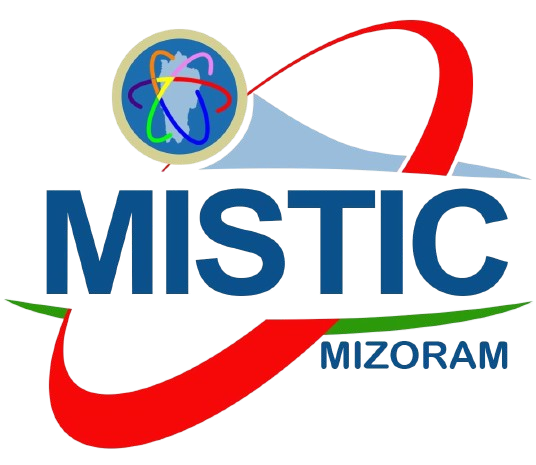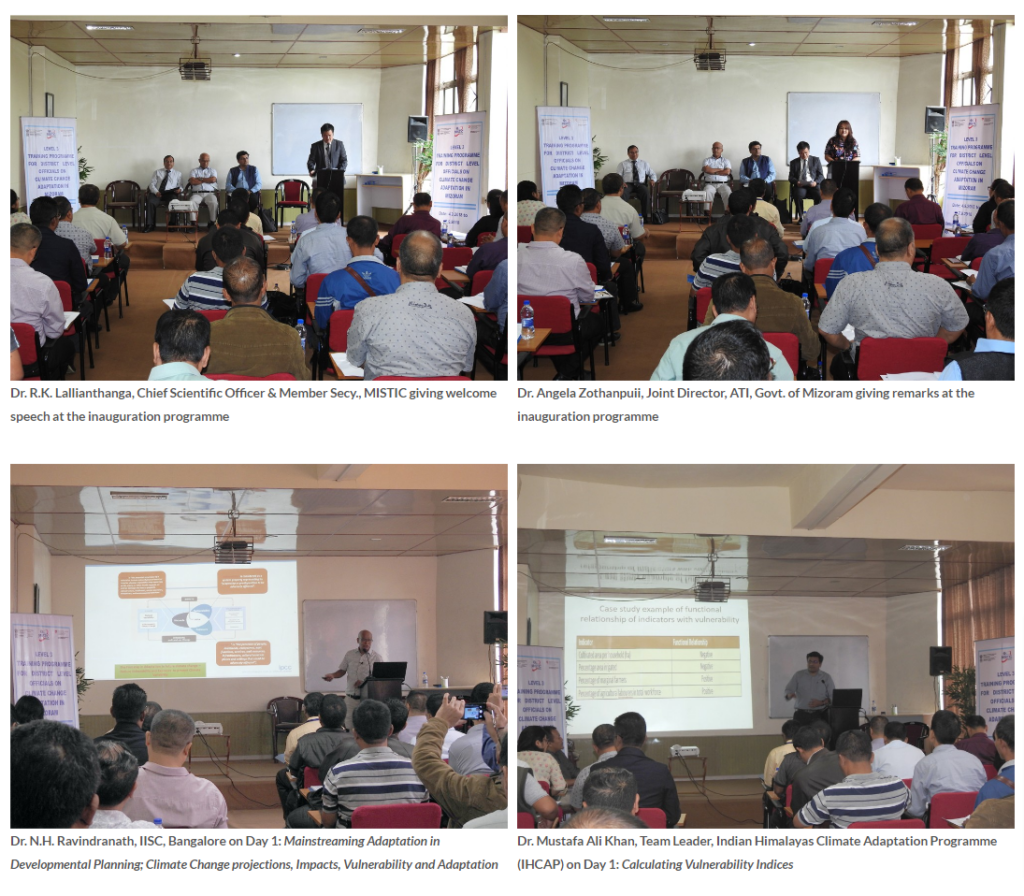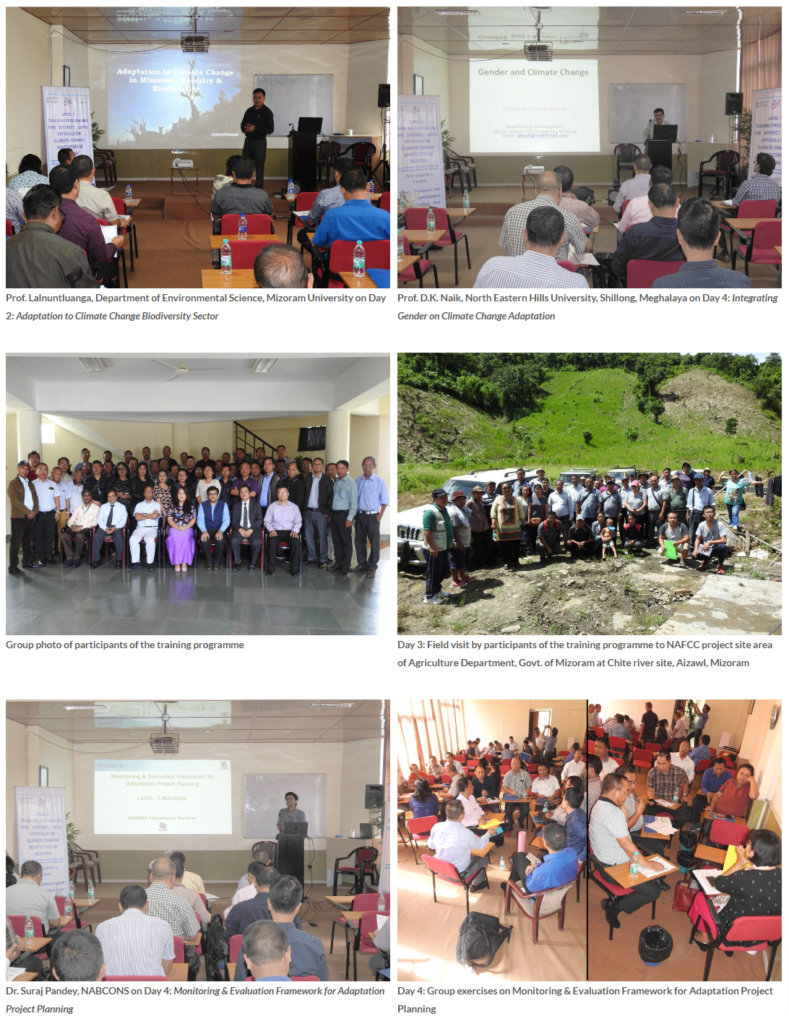LEVEL 3 TRAINING PROGRAMME FOR DISTRICT LEVEL OFFICIALS ON CAPACITY BUILDING PROGRAMME ON CLIMATE CHANGE ADAPTATION PLANNING
Home > SCCCC > Phase I > LEVEL 3 TRAINING PROGRAMME FOR DISTRICT LEVEL OFFICIALS ON CAPACITY BUILDING PROGRAMME ON CLIMATE CHANGE ADAPTATION PLANNING
Date : 4-7 September, 2018
Venue : Administrative Training Institute, Govt. of Mizoram, Mizoram Secretariat Complex, Khatla, Aizawl, Mizoram
Organized by
Mizoram State Climate Change Cell under Mizoram Science, Technology and Innovation Council (MISTIC) and NABARD Consultancy Services (NABCONS) through the support of Indian Himalayas Climate Adaptation Programme (IHCAP), a bilateral programme of Swiss Agency for Development and Cooperation (SDC), Embassy of Switzerland, India and Department of Science and Technology, Government of India.
BACKGROUND
The National Mission for Sustaining the Himalayan Ecosystem (NMSHE) is one of the eight core “national missions” of the National Action Plan on Climate Change (NAPCC). NMSHE intends to evolve suitable management and policy measures for sustaining and safeguarding the Himalayan ecosystem along with developing capacities at the national level to continuously assess its health status. The Indian Himalayas Climate Adaptation Programme (IHCAP) of the Swiss Agency for Development and Cooperation is being implemented in coordination with the Department of Science and Technology, Government of India as the knowledge and technical partner of NMSHE. The overall goal of IHCAP is to strengthen the resilience of vulnerable communities in the Himalayas and to enhance and connect the knowledge and capacities of research institutions, communities and decision-makers.
As part of NMSHE activities, State Climate Change Cell (SCCC) has been set up and strengthened in Mizoram. One of the key activities under the support to SCCC is organizing training programmes for institutional capacity building. IHCAP is working with Mizoram SCCC to organize capacity building programmes on adaptation planning and implementation. IHCAP is providing support to Mizoram for designing and developing these orientations and training programmes through NABARD Consultancy Services (NABCONS), the consulting wing of NABARD.
Through these backgrounds, the Mizoram State Climate Change Cell has been conducting Training Needs Assessment (TNA), Capacity building programmes for Climate Change Adaptation at different levels of government officials in Mizoram through training were being organized in consultation with NABCONS. Level 1 for Legislatures & Bureaucrats and Level 2 for State Level Officials has already been conducted during 2017. In order to conduct subsequent level 3 for district officials and level 4 for training of trainers, a designated host institution needs to be established, in this regard, a Memorandum of Understanding was signed between Mizoram State Climate Change Cell and Administrative Training Institute (ATI), Govt. of Mizoram on 26th April 2018 with an aim that ATI will continue to host the subsequent capacity building programmes. Following the MoU, a 4 days Level 3 training programme for district level officials on capacity building programme for climate change adaptation planning was organized at ATI, Govt. of Mizoram during 4 to 7 September 2018.
INAUGURATION
The training programme was inaugurated by Dr. R.K. Lallianthanga, Chief Scientific Officer & Member Secretary, Mizoram Science, Technology and Innovation Council (MISTIC) by giving an introductory remark. Dr. Mustafa Ali Khan, Team Leader, IHCAP also gave a special remarks by introducing the programme of IHCAP and the collaboration and role played by IHCAP, Mizoram SCCC, ATI and NABCONS in organizing the capacity building programme on climate change adaptation planning. Mrs. Angela Zothanpuii, Joint Director, ATI, Govt. of Mizoram also gave remarks to the training programme. Dr. R.K. Srivastava, General Manager/OIC NABARD, Mizoram Regional Office and Prof. NH Rabindranath, Indian Institute of Science, Bangalore also gave special remarks to the programme. Mr Samuel Lalmalsawma, Senior Scientific Officer, MISTIC then delivered a vote of thanks to the participants. The training programme was commence following the inaugural function.
DAY 1 (4.9.2018)
The First Session started with a presentation by Prof. NH Rabindranath, Indian Institute of Science, Bangalore where he gave a talk on a topic “Mainstreaming Adaptation in Developmental Planning; Climate Change projections, Impacts, Vulnerability and Adaptation”. He also gave a lecture on Case Study Example of Vulnerability Estimation. The second session has two speakers from Mizoram State Climate Change Cell, Dr. James Lalnunzira Hrahsel, Project Scientist gave a presentation on Ongoing Initiatives of Mizoram State Climate Change Cell. He briefly highlights the creation, objectives, activities of Mizoram State Climate Change followed with a brief overview of the climate scenarios of Mizoram using thirty years meteorological data from 1986-2016. Mr Lalthanpuia, Project Scientist then gave a presentation on Climate Scenario of Mizoram highlighting the temperature and rainfall trend of different districts of Mizoram over the past 32 years. The third session also has two speakers in which Dr. Mustafa Ali Khan gave detail lecture on Calculating Vulnerability Indices using illustrative examples. Prof. Shiva Kumar, Prof. Shiva Kumar, Dean /Head, School of Earth Sciences & Natural Resource Management, Mizoram University then gave a presentation on a topic Adaptation to Climate Change in Indian Himalayan Region. There was an interactive discussion after each presentation.
DAY 2 (5.9.2018)
The first session was a talk by Prof. Lalnuntluanga, Department of Environmental Sciences, Mizoram University on a topic ‘Adaptation to Climate Change Biodiversity Sector’ followed by Dr. Jotish Nongthombam, SMS, KVK, Aizawl who gave a talk on a topic ‘Adaptation to Climate Change in Water Sector’. The third speaker was Dr. Saurav Saha, Scientist, ICAR Complex for NEH Region, Kolasib, Mizoram who gave a talk on a topic ‘Adaptation to Climate Change in Agriculture and Horticulture Sector’. The last speaker of the second day was Dr. Lalrokima Chenkual. Asst. Director, Disaster Management & Rehabilitation Department, Govt. of Mizoram who also gave a talk on ‘Adaptation to Climate Change and Disaster Risk Reduction’. An interactive discussion followed each presentation in which questions from participants were answered by the invited speakers.
DAY 3 (6.9.2018)
The third day of the training programme was utilized to visit a project site at Chite river bank within Aizawl area under Agriculture Department, Govt. of Mizoram. The project site was managed under the project received from National Adaptation Fund on Climate Change (NAFCC). 30 participants went to the field visit site where they interact with 2 local beneficiary households. Questions were raised on the activity at the project site in regard to climate change adaptations.
DAY 4 (7.9.2018)
The last day of the training programme was started with a presentation on a topic ‘Integrating Gender in Climate Change Adaptation’ by Prof. D.K Naik, North-eastern Hills University (NEHU), Shillong. The remaining two sessions were from Dr. Suraj Pandey, Consultant, NABCONS in which in the first session, he talks about climate finance using a topic “Monitoring & Evaluation Framework for Adaptation Project Planning“. He explained broadly the global and national climate financial structure and availability, the entity with which finance is available and under which theme can climate finance can be pulled in. He also explained to the participants on the proper procedure for submitting a project proposal to the entity who is recognized by the government in India. He also gave a brief point by point guidelines for developing a proposal for climate change adaptation and mitigation projects. A second session was a group in which participants were divided into different groups. Each group were assigned a task to write key points for concept note for a project proposal according to the points given by Dr. Suraj Pandey in his presentation. These points were then presented by a representative of each group which goes hand in hand with an interactive session.
A quick recap was made by Dr. Suraj Panday, on the overview of the training programme. Feedbacks and comments were heard from the participants. Participation certificate were distributed after which the 4 days long training programme was closed. Total of 44 participants from different line departments from different districts of Mizoram, 5 local resource persons, 5 invited guest speakers and MISTIC staff attended the programme.


